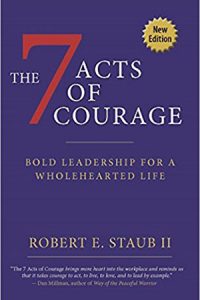Do you know a false choice when you see one?
Failure of imagination is one of the most significant sources of pain in life. When your range of perception narrows to a digital, “either-or” response, it can easily lead to a sense of entrapment, even to despair. Living out of this kind of tunnel vision quickly collapses the possibility for fresh, new perspectives.
By activating The Courage to Learn and Grow and also The Courage to be Confronted, you can harness creativity toward fresh, novel action steps.

Perceptions dictate your choices.
Your perceptions govern the choices you are able to conceive, and therefore to move from. Old mental patterns can severely limit your perceptions. They can act like “spells” – repetitive incantations that create a cage around your imaginative powers, chaining them to sub-optimal ways of perceiving, thinking, reacting and being.
These cognitive patterns, or mental habits, inevitably lead to what my colleague Wayne Gerber and I call “false choice.” False choice is what you are left with when the doors of perception are slammed shut by limited ways of thinking and conceiving.
You can see the misery of false choice all around you: at work, at home, in society. Conflicts between polarities are all over front page news, instead of a focus on common ground and novel solutions. Making a forced choice out of limited perception so often leads to less than joyful outcomes.
An example of False Choice.
Many years ago I served as the clinical director of a crisis center. Our hotline and walk-in center focused on people in psychological, emotional or physical distress. One of the major services we provided was suicide prevention.
People would call in feeling suicidal, or having already taken some life-threatening action in need of emergency intervention. Every one of the hundreds of calls received each month could be viewed as a case in which the caller felt his or her options had narrowed, in essence, to: “I must end my life, or continue on in misery and suffering.”
These were cases of false choice. In each instance, life experiences combined with shrinking patterns of responding, had led to this limiting “either-or” false choice.

The crisis center volunteers and professional staff were trained as skilled listeners and had clear intervention strategies to use. One of the most powerful “spell-breaking,” perception-expanding strategies we used involved the use of imagination. After a short, careful phase of listening, eliciting vital information and connecting with the caller, the counselor was to make a request: “May I please speak to the part of you that wants to live?”
The fact that the distressed person had reached out in the first place indicated, after all, that some part of him or her still wanted to live. Inevitably, when this request was made, the caller spoke in a slightly different “voice,” one that could express a desire for help but just could not see any other options. This is where the crisis counselor could truly help by expanding the range of possibilities and helping to problem-solve with the caller (while also getting emergency response teams dispatched.)
All too often, suicide is a false choice.
It’s fed by a narrowed perceptual and lack of imagination in the individual, and of society itself. (Surely, as a society, we can come up with better ways to ensure that ALL humans live in dignity and have an opportunity to lead lives of connection, meaning and purpose.)
It is safe to say that no one can know the mind of the infinite, so it is literally true that there are many things you have yet to perceive or conceive of. It can also be said that the range of options before you are far greater than you currently may be aware of. The only limit on that is your ability to openly access the power of imagination.
You cannot change the reality of the moment before you, of the Now. However, you can change what you think about it, how you choose to interpret it, how you will respond to it. This is the innate power you have and is limited only by the faculty of your imagination.
Another example of false choice at work.
A senior leader I was working with told me that his passion was coaching. When he retired from the corporate world and was financially independent, he planned to do what he loved and volunteer as a coach for youth teams. He said, “I really don’t like my job, and yet it pays the bills and I have to do it for another five years before I can do what I love.”
This was a clear case of false choice. Accessing your imagination, what options can you discern? What is the option this executive was NOT seeing? Is there a choice that would allow him passion in his life, without waiting for retirement?

When I asked this executive what he loved about coaching, he stated, “Helping young people learn and grow, and to realize they can do more than they thought possible; shaping their lives by coaching them to play the game at their best, while also enjoying themselves.”
When asked if there were young people at his place of work, he answered in the affirmative. When asked if helping those young men and women to learn, grow, and be successful at the “game of business,” while also enjoying themselves, was consistent with his dream of coaching, his mouth dropped open. “Yes, it is completely consistent,” he said.
He took his love of coaching into his place of work, in fact working with all age groups, and found himself doing what he loved to do. He did not have to wait until he retired. Using this expanded perception of “coaching,” he helped increase bottom-line outcomes by building high performance teams.
He was promoted to a higher-level job, and could then help develop even more great teamwork. All of this happened when he had the courage to break the “spell” of false choice.

What are the false choices YOU are making?
Where could an expansion of your imaginative abilities lead you? Do you have the courage to step back and admit you may be seeing things from too narrow a perspective? Will you have the courage to ask for some outside guidance and perspective from someone not enmeshed in your ways of thinking and perceiving?
Call to Action:
Take the time to outline something with which you have been struggling. What are the set of options you have come up with to date? Are they based on “either-or” thinking? What might a more imaginative perspective offer? Who do you know who is a creative problem-solver, someone who could have a wider perspective regarding the challenge or issue that you are facing?
With outside help as needed, come up with a least six additional (6) options of how to move with what you are facing. Be willing to stretch with your ideas and even be a little bit unrealistic; there is often a solid, next-step choice imbedded in “crazy solutions.”
Go ahead; give yourself the gift of imaginative choice!
Would you like to win a copy of The 7 Acts of Courage?
Answer the question below in the comment section below, then click here to mark your entry as complete. One winner at random will be selected on 9-24-17 to receive a free copy of this book. Leave your comment below and Enter Now!
What situation in your life right now could be helped by looking beyond false choice and using your imagination?


